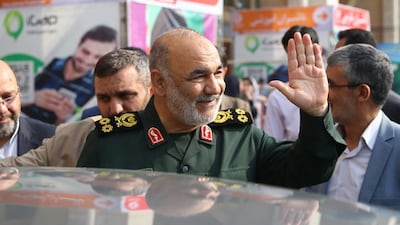As tensions continue to increase in the Arabian Gulf, Iran’s Supreme leader Ayatollah Ali Khamenei is relying on a newly elevated commander versed in the kind of psychological warfare that Tehran has pursued while attempting to build an aura of invincibility around its military and militia proxies.
Brigadier General Hossein Salami was appointed in April this year to head the Guardians of the Islamic Revolution, better known as the Islamic Revolutionary Guard Corps (IRGC), elite units responsible for the vaguely defined task of protecting and furthering the 1979 Islamic revolution now at the forefront of tensions with the United States.
His career, like that of many in Iran’s power circles, was shaped by the war with Iraq in the 1980s, a conflict whose memory contributes to Iran’s confident rhetoric but does not make its military commanders invincible.
While domestic factors may have influenced Gen Salami’s appointment, he made his mark internationally when the IRGC downed a US surveillance drone last week. Gen Salami said the downing signalled “decisive and knockout reactions to aggression”. A few weeks before he declared Iran an “absolute” regional power and predicted all-out conflict with the United States before asserting that Iran does not want war.
His anti-US tirades are even more fervent than those of his ideological peers and his earlier career highlights show ability to exploit relatively minor incidents to full effect .
Gen Salami was deputy commander of the IRGC in 2016 when the guards detained for 15 hours eight US sailors whose boat had strayed into Iranian waters, Washington said after mechanical failure. Gen Salami was reported as saying that the sailors were crying when they were captured. A photo from the time shows Gen Salami smiling as Ayatollah Khamenei congratulated him for detaining the sailors.
In 2007, the IRGC detained 15 members of the British Royal Navy in the Shatt Al Arab waterway separating Iraq and Iran and held them for 15 days. It was another incident Iran portrayed as indicative of its military prowess.
Born in 1960 in the Esfahan region, Gen Salami joined the IRGC early in the Iraq-Iran war, when he was a college student. He rose through the ranks, becoming deputy commander around a decade ago. He replaced major General Mohammad Ali Jafari in April, a day after the US designated the IRGC a foreign terrorist organisation.
Some Iran specialists argue that the IRGC overshadows the country’s military, pointing to the IRGC’s external division, the Al Quds force, which liaises with Shi’ite militias in Iraq, Syria and Lebanon as well as with the Hamas movement and Islamic Jihad in Gaza. Qassem Suleimani, head of Al Quds force, commanded troops in the war with Iraq. Ayatollah Khamenei was for most of the conflict president and Hassan Rouhani, Iran’s current president, was a senior war planner.
The war ended in a stalemate but it shaped the psyches of the two countries, which both ignored the brutalities they had dealt each other. While Iran, alongside Iraq’s Kurd’s in the north, bore the brunt of Saddam Hussein’s chemical weapons programme, civilians were a target on both sides.
Mehdi Khalaji, a fellow at the Washington Institute for Near East Policy, said in a research note last month that Gen Salami will act as an enforcer of Ayatollah Khamenei’s so called resistance policy, which relies on “innovatively circumventing economic sanctions, developing Iran’s missile programme and maintaining the regime’s defiant regional policy”.
“Compared to his ousted predecessor, Salami is both ideologically closer to Khamenei and more hard-line in his views,” Mr Khalaji said.


